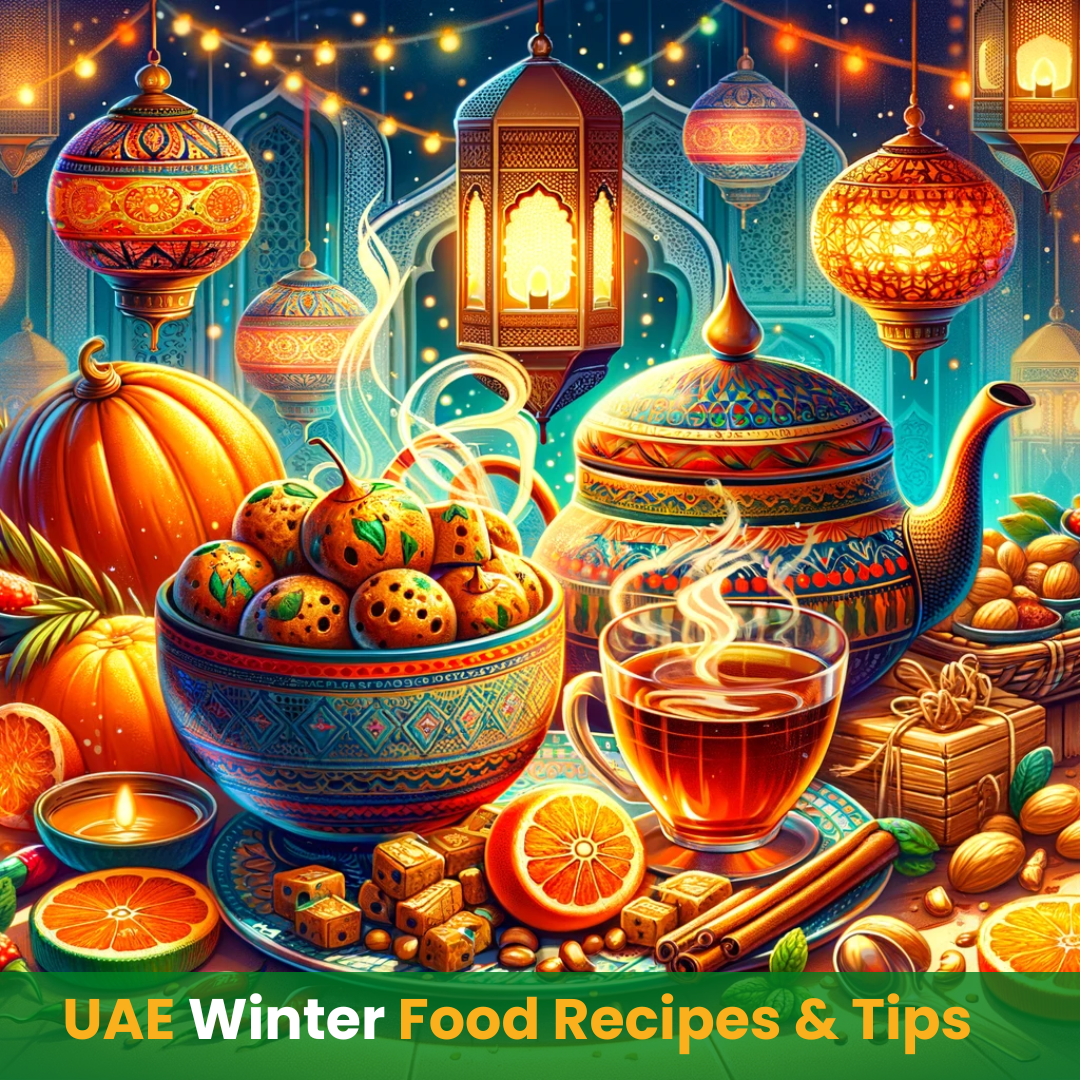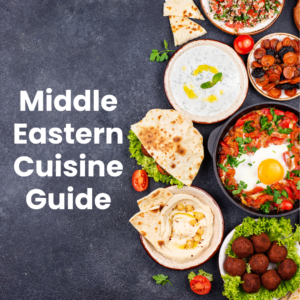Winter Food Recipes and Tips for a Cozy UAE Season
Welcome to “Warm Delights,” where we dive into the heartwarming realm of winter cuisine in the United Arab Emirates. While the UAE is renowned for its blazing sun and sprawling deserts, winter here has its own unique charm. The season is a refreshing change, marked by cooler temperatures and a shift in the cultural landscape. This is a time when the outdoor becomes more inviting, and the culinary scene adapts to embrace the subtle chill in the air.
Food plays a pivotal role in enhancing the winter experience in the UAE. It’s not just about nourishment; it’s about warmth, comfort, and a celebration of flavors that resonate with the season. Traditional dishes get a winter makeover, incorporating ingredients that are both warming and nutritious. Similarly, the global influence on the UAE’s cuisine means that winter foods from around the world find a place on the Emirati dining table, albeit with a delightful local twist.
In this blog post, we will embark on a culinary journey, exploring recipes that will not only tantalize your taste buds but also provide the much-needed warmth during the UAE winter. From hearty soups and stews that have been passed down through generations, to modern takes on classic winter beverages, we have something for every palate. We’ll also share essential cooking tips to help you maximize flavor and nutrition in your winter meals.
Whether you’re a long-time resident or a curious traveler, these recipes and tips will help you embrace the winter season in the UAE in the most delicious way possible. So, let’s get ready to add some warmth to your kitchen with these winter delights!
UAE Winter Cuisine
Winter in the United Arab Emirates brings with it a delightful shift in the culinary landscape, marked by the infusion of traditional flavors and the adaptation of international recipes to suit the local palate. As the temperature dips, the food becomes richer, warmer, and more comforting, reflecting the cultural heritage and the diverse influences that shape Emirati cuisine.
Exploring Traditional Winter Foods in the UAE
In the cooler months, traditional Emirati dishes take center stage. These recipes, often passed down through generations, are not just meals but a part of the UAE’s cultural fabric. One such staple is Harees, a hearty and comforting wheat and meat porridge, slow-cooked to perfection and seasoned with local spices. Another winter favorite is Majboos, a fragrant rice dish cooked with meat or fish, imbued with a blend of spices and served with a side of yoghurt or salad. These dishes are not only fulfilling but also provide the necessary energy and warmth for cooler days.
The Role of Spices and Ingredients in Winter Dishes
Spices play a crucial role in winter cuisine in the UAE. They are not just flavor enhancers but also hold therapeutic properties to help cope with the colder weather. Spices like cinnamon, cardamom, saffron, and turmeric are commonly used. These spices not only impart warmth and flavor but are also known for their health benefits, including anti-inflammatory properties and the ability to boost immunity.
Local ingredients like dates, nuts, and dried fruits are also winter staples, often added to dishes for extra nutrition and energy. The use of ghee (clarified butter) and olive oil in cooking not only enhances flavor but also provides essential fats needed for the cooler season.
Adaptation of International Winter Recipes to the UAE Palate
The UAE is a melting pot of cultures, and this is reflected in its cuisine. Winter dishes from around the world are adapted to suit the local palate, with a special Emirati twist. For instance, soups and stews might be infused with Middle Eastern spices, or a classic hot chocolate might be elevated with a hint of cardamom or saffron. This fusion approach not only adds an exciting variety to the winter menu but also showcases the UAE’s openness to global culinary influences while retaining its unique culinary identity.
In short, winter in the UAE is a time to savor rich, spiced, and nourishing dishes that reflect both the traditional and contemporary aspects of Emirati cuisine. The use of local spices, ingredients, and the adaptation of international recipes create a winter culinary experience that is both unique and comforting.
Top Winter Recipes for the UAE
As the UAE welcomes the cooler season, kitchens buzz with the preparation of warm, comforting dishes. Here, we delve into some top winter recipes that perfectly capture the essence of the UAE’s culinary traditions and its innovative spirit.
Warm Soups and Stews
1. Traditional Lamb Harees
A classic Emirati dish, Harees is particularly popular during winter. This hearty wheat and lamb stew is both simple and deeply nourishing.
- Ingredients:
- 2 cups of hulled wheat, soaked overnight
- 1 kg lamb (with bone), cut into chunks
- 8 cups of water
- Salt, to taste
- 1 tsp cinnamon (optional)
- Clarified butter (for serving)
- Method:
- Rinse the soaked wheat and drain. In a large pot, combine the wheat, lamb, and water. Bring to a boil.
- Reduce the heat to low, cover, and simmer for about 4 hours, or until the meat is tender and the wheat has a porridge-like consistency.
- Remove the bones, and beat the mixture with a wooden spoon or masher until smooth and well combined.
- Season with salt and a pinch of cinnamon, if using.
- Serve hot, topped with a dollop of clarified butter.
2. Spiced Lentil Soup with Local Herbs
This is a lighter option, enriched with spices and local herbs, perfect for a winter evening.
- Ingredients:
- 1 cup red lentils, rinsed
- 1 large onion, finely chopped
- 2 carrots, diced
- 2 tomatoes, chopped
- 1 tsp turmeric
- 1 tsp cumin
- 1 tsp coriander
- 6 cups vegetable stock
- Fresh coriander and parsley, chopped
- Lemon juice, salt, and pepper to taste
- Method:
- In a large pot, sauté the onions until golden. Add the carrots and cook for a few minutes.
- Add the tomatoes, lentils, turmeric, cumin, and coriander. Stir well.
- Pour in the vegetable stock and bring to a boil. Reduce the heat and simmer for about 30 minutes.
- Once the lentils are tender, use a hand blender to puree the soup to your desired consistency.
- Stir in the fresh herbs, lemon juice, salt, and pepper.
- Serve hot with a slice of lemon.
Hearty Mains
3. Emirati Spiced Roast Chicken
A flavorful twist on a classic, this roast chicken is marinated in traditional Emirati spices.
- Ingredients:
- 1 whole chicken, cleaned and patted dry
- 2 tbsp olive oil
- 1 tbsp bezar spice mix (a traditional Emirati spice blend)
- 1 tsp turmeric
- 1 tsp ground cumin
- 1 lemon, juiced
- Salt and pepper to taste
- Method:
- Preheat your oven to 180°C (350°F).
- In a bowl, mix olive oil, bezar, turmeric, cumin, lemon juice, salt, and pepper. Rub this mixture all over the chicken, inside and out.
- Place the chicken in a roasting tin and roast for about 1 hour and 20 minutes, or until the juices run clear.
- Let the chicken rest for 10 minutes before carving.
- Serve with roasted vegetables or a side of rice.
4. Vegetable Biryani with a Winter Twist
A vegetarian delight, this biryani is loaded with winter vegetables and fragrant spices.
- Ingredients:
- 2 cups basmati rice, soaked for 30 minutes
- 1 cup mixed winter vegetables (carrots, cauliflower, peas)
- 1 large onion, sliced
- 2 tomatoes, chopped
- 1 tbsp ginger-garlic paste
- 1 tsp garam masala
- 1/2 tsp turmeric
- 1/2 tsp red chili powder
- 4 cups hot water
- Saffron strands, soaked in warm milk
- Fresh mint and coriander leaves
- Salt, to taste
- Oil for cooking
- Method:
- In a large pot, heat oil and sauté the onions until golden. Add the ginger-garlic paste and sauté for a minute.
- Add the chopped tomatoes, mixed vegetables, garam masala, turmeric, and chili powder. Cook until the vegetables are tender.
- Add the soaked and drained rice to the pot. Stir gently to mix.
- Pour in the hot water, add salt, and bring to a boil. Then reduce the heat, cover, and simmer until the rice is cooked and the water is absorbed.
- Drizzle the saffron-infused milk over the cooked biryani.
- Garnish with fresh mint and coriander leaves before serving.
Warm Beverages
5. Saffron and Cardamom Karak Tea
A fragrant and soothing beverage, perfect for chilly evenings.
- Ingredients:
- 2 cups water
- 2-3 black tea bags
- 1/4 cup evaporated milk
- 1/4 tsp cardamom powder
- A pinch of saffron strands
- Sugar to taste
- Method:
- In a saucepan, bring water to a boil. Add the tea bags, cardamom, and saffron.
- Simmer for a few minutes until the tea is strong.
- Add the evaporated milk and sugar. Bring to a boil again.
- Strain and serve hot.
6. UAE Style Hot Chocolate
A luxurious twist on classic hot chocolate, enriched with Middle Eastern flavors.
- Ingredients:
- 2 cups milk
- 100g dark chocolate, chopped
- 1/2 tsp cinnamon powder
- A pinch of nutmeg
- Whipped cream (for topping)
- Crushed pistachios (for garnish)
- Method:
- Heat the milk in a saucepan until it’s warm.
- Add the chopped chocolate, cinnamon, and nutmeg. Whisk until the chocolate is melted and the mixture is smooth.
- Pour into mugs, top with whipped cream, and sprinkle crushed pistachios.
- Serve immediately for a cozy and indulgent treat.
These recipes showcase the rich and diverse flavors of the UAE’s winter cuisine, offering both comfort and a taste of Emirati culinary heritage. Enjoy these dishes with family and friends to make the most of the cooler season.
Cooking Tips for Winter Foods
Winter cooking is not just about following recipes; it’s about understanding the essence of the ingredients and techniques that make these dishes comforting and nutritious. Here are some essential tips for cooking and storing winter foods that will help you make the most of the season’s produce and flavors.
Selecting the Right Ingredients for Warmth and Nutrition
- Opt for Seasonal Produce: Winter vegetables like carrots, squash, sweet potatoes, and leafy greens are not only at their peak of flavor but are also packed with nutrients that are essential for the colder months.
- Incorporate Whole Grains and Legumes: Ingredients like barley, oats, lentils, and beans are excellent for winter dishes. They provide fiber, protein, and essential nutrients, keeping you fuller and warmer for longer.
- Choose Lean Proteins: Opt for lean cuts of meat, poultry, or fish. These proteins are crucial for maintaining energy levels and supporting immune health during the winter.
- Utilize Healthy Fats: Incorporate healthy fats like olive oil, nuts, seeds, and avocados. These fats are not only heart-healthy but also aid in the absorption of vitamins and provide necessary warmth.
- Spice it Up: Spices like cinnamon, ginger, turmeric, and cloves are not just flavor enhancers; they also offer warmth and have medicinal properties beneficial for winter wellness.
Techniques to Enhance Flavors in Winter Cooking
- Slow Cooking: Utilize slow cooking methods like braising, stewing, and roasting. These methods deepen the flavors and create dishes that are comforting and hearty.
- Layering Flavors: Start with a good base of aromatics like onions, garlic, and herbs. Build layers of flavor by adding spices and seasonings gradually.
- Browning is Key: Whether you’re cooking meat or vegetables, allowing them to brown properly adds depth and richness to the dish. This caramelization brings out the natural sweetness and intensifies the overall flavor.
- Use Stocks and Broths: Cooking with stocks or broths instead of water adds extra flavor and richness to soups, stews, and even rice dishes.
- Balancing Flavors: Winter dishes often require a balance of flavors. Don’t shy away from adding a dash of acidity (like lemon juice or vinegar) or a bit of sweetness (like honey or maple syrup) to round out the flavors.
Tips on Cooking and Storing Winter Dishes
- Cook in Batches: Winter dishes like soups and stews are perfect for batch cooking. They usually taste even better the next day as the flavors have more time to meld.
- Proper Storage: Store soups and stews in airtight containers in the refrigerator. They can typically last up to 3-4 days. For longer storage, freeze them in portion-sized containers.
- Reheat Gently: When reheating, do it gently over low heat to preserve the flavors and textures of the dish. Avoid overheating as it can degrade the quality of the food.
- Keep it Safe: Always cool down hot foods before refrigerating. Divide large pots of soups or stews into smaller containers to cool them quickly and refrigerate promptly.
- Be Mindful of Freezer Burn: When freezing dishes, make sure to use freezer-safe containers and eliminate as much air as possible to prevent freezer burn.
By keeping these tips in mind, you can enhance your winter cooking experience, ensuring your dishes are not only delicious but also nourishing and comforting during the cooler months.
Health and Nutrition in Winter Foods
Winter cuisine, with its rich flavors and hearty ingredients, offers numerous health benefits. Understanding the nutritional value of common winter ingredients and incorporating them wisely into your diet can ensure you enjoy the season’s indulgences while maintaining good health.
Nutritional Benefits of Common Winter Ingredients
- Root Vegetables: Carrots, beets, and sweet potatoes are winter staples. They are high in fiber, vitamins (A, C, and K), and minerals like potassium. They also contain antioxidants and can support healthy digestion and vision.
- Leafy Greens: Winter greens like kale, spinach, and Swiss chard are nutrient powerhouses, rich in vitamins A, C, and K, iron, calcium, and fiber. They boost immunity and are beneficial for bone health.
- Whole Grains and Legumes: Grains like barley, quinoa, and legumes like lentils and beans are excellent sources of plant-based protein and fiber. They help in maintaining blood sugar levels and provide sustained energy.
- Nuts and Seeds: Almonds, walnuts, chia seeds, and flaxseeds are great sources of healthy fats, protein, and fiber. They also contain omega-3 fatty acids, beneficial for heart health.
- Spices: Cinnamon, ginger, turmeric, and garlic not only add flavor but also possess anti-inflammatory and antioxidant properties. They can help in combating colds and boosting overall immunity.
Balancing Indulgence with Health in Winter Meals
- Portion Control: Enjoy winter treats but be mindful of portion sizes. This helps in maintaining a balance between indulgence and health.
- Healthy Substitutes: Opt for healthier cooking methods like baking, grilling, or steaming instead of frying. Use whole-grain flours, natural sweeteners, and low-fat dairy products in your winter baking.
- Stay Hydrated: In the cooler weather, we often forget to drink enough water. Staying hydrated is crucial for overall health and can aid in digestion and skin health.
- Incorporate Fruits and Vegetables: Ensure that each meal has a good portion of fruits and vegetables. They provide essential vitamins and minerals and help in balancing heavier winter meals.
Incorporating Local Superfoods into Winter Diets
- Dates: A staple in the Middle Eastern diet, dates are rich in fiber, potassium, and iron. They are a natural sweetener and can be added to desserts or eaten as a snack.
- Honey: Often used in traditional remedies, honey has antibacterial and antiviral properties. It can be used as a natural sweetener in teas and desserts.
- Camel Milk: Rich in vitamins and minerals, camel milk is lower in fat and lactose compared to cow’s milk. It can be a nutritious addition to your diet.
- Local Fish: Fish like hammour or safi, found in the Arabian Gulf, are rich in omega-3 fatty acids. Including local fish in your diet supports heart health and cognitive function.
- Ghee: While high in saturated fat, ghee is used in moderation in traditional cooking for its rich flavor. It contains fat-soluble vitamins and can be a healthier alternative to processed oils and fats.
By focusing on the nutritional aspects of winter ingredients and balancing indulgence with healthy choices, you can enjoy the season’s culinary delights while nourishing your body and supporting overall wellness.
Read Understanding Supplements: What You Need to Know for Your Health in UAE
Entertaining During the UAE Winter
Winter in the UAE is a delightful time for social gatherings and entertaining. The cooler weather opens up numerous opportunities for hosting events that combine traditional Emirati hospitality with the joy of the season. Here are some ideas and tips for organizing memorable winter-themed dinner parties and outdoor dining experiences, along with insights into the cultural aspects of winter gatherings in the UAE.
Ideas for Winter-Themed Dinner Parties
- Themed Decor: Create a cozy ambiance with a winter theme, using warm colors, soft lighting, and traditional Emirati accents. Incorporate elements like lanterns, patterned cushions, and elegant tableware to set the mood.
- Traditional Emirati Menu: Offer a spread that features classic Emirati dishes like Harees, Majboos, and Luqaimat. You can also include a modern twist on these dishes to cater to diverse palates.
- Interactive Food Stations: Set up stations where guests can customize their Karak tea with different spices or create their own mezze platter. This adds an interactive element to the dining experience.
- Live Cooking Demonstrations: Arrange for a chef to prepare traditional dishes live. This not only entertains guests but also allows them to learn about Emirati cooking techniques and recipes.
- Cultural Entertainment: Include traditional Emirati music and dance performances to give guests a rich cultural experience.
Tips for Outdoor Winter Dining in the UAE
- Comfortable Seating: Ensure ample and comfortable seating arrangements. Traditional floor seating with cushions and low tables can create an authentic and cozy atmosphere.
- Weather-Appropriate Setup: Although winters are milder, evenings can be cool. Consider having outdoor heaters or fire pits for warmth, and offer shawls or blankets for guests.
- Ambient Lighting: Use soft, ambient lighting such as string lights, lanterns, or candles to create a warm and inviting environment.
- Grilling and Barbecue: Utilize outdoor grills for a barbecue experience. Dishes like grilled meats and seafood are not only delicious but also add to the festive atmosphere.
- Outdoor Entertainment: Plan activities like storytelling, traditional games, or even an outdoor movie screening for a unique experience.
Cultural Aspects of Winter Gatherings in the UAE
- Hospitality: In Emirati culture, hospitality is paramount. Ensure that guests are warmly welcomed, and there is an abundance of food and drink.
- Communal Dining: Meals are often served family-style, promoting sharing and community. Include large platters of food that guests can share.
- Respecting Traditions: Be mindful of cultural norms and traditions. This includes consideration for local dress codes, dietary restrictions, and prayer times.
- Inclusion of Dates and Coffee: Serving dates and Arabic coffee is a traditional gesture of hospitality in the UAE. Include these in your gathering as a welcoming gesture.
- Storytelling and Poetry: Incorporate elements of Emirati storytelling or poetry reading, which are integral parts of the culture and offer a unique entertainment aspect.
Entertaining during the UAE winter provides an excellent opportunity to celebrate the season’s charm and the rich Emirati culture. By blending traditional elements with thoughtful planning, you can create a warm, inviting, and culturally rich dining experience for your guests.
Winter Food Recipes and Tips for a Cozy UAE Season: Final Thoughts
As we wrap up our culinary journey through the UAE’s winter season, we reflect on the diverse and rich flavors that define this enchanting time of the year. From the heartwarming Traditional Lamb Harees to the comforting Spiced Lentil Soup, and from the festive Emirati Spiced Roast Chicken to the indulgent UAE Style Hot Chocolate, each recipe offers a taste of the UAE’s culinary heritage and its modern adaptations. The cooking tips and nutritional insights shared aim to enhance your winter dining experience, ensuring each meal is not just delicious but also nourishing. We encourage you to experiment with these recipes and tips, embracing the seasonal produce and flavors to create your own winter culinary delights. Remember, winter in the UAE is a time of warmth, hospitality, and joyous gatherings, and what better way to celebrate it than through the rich tapestry of its food. So, embrace the cooler weather, gather your loved ones, and let the flavors of the UAE’s winter cuisine add a touch of magic to your meals.



